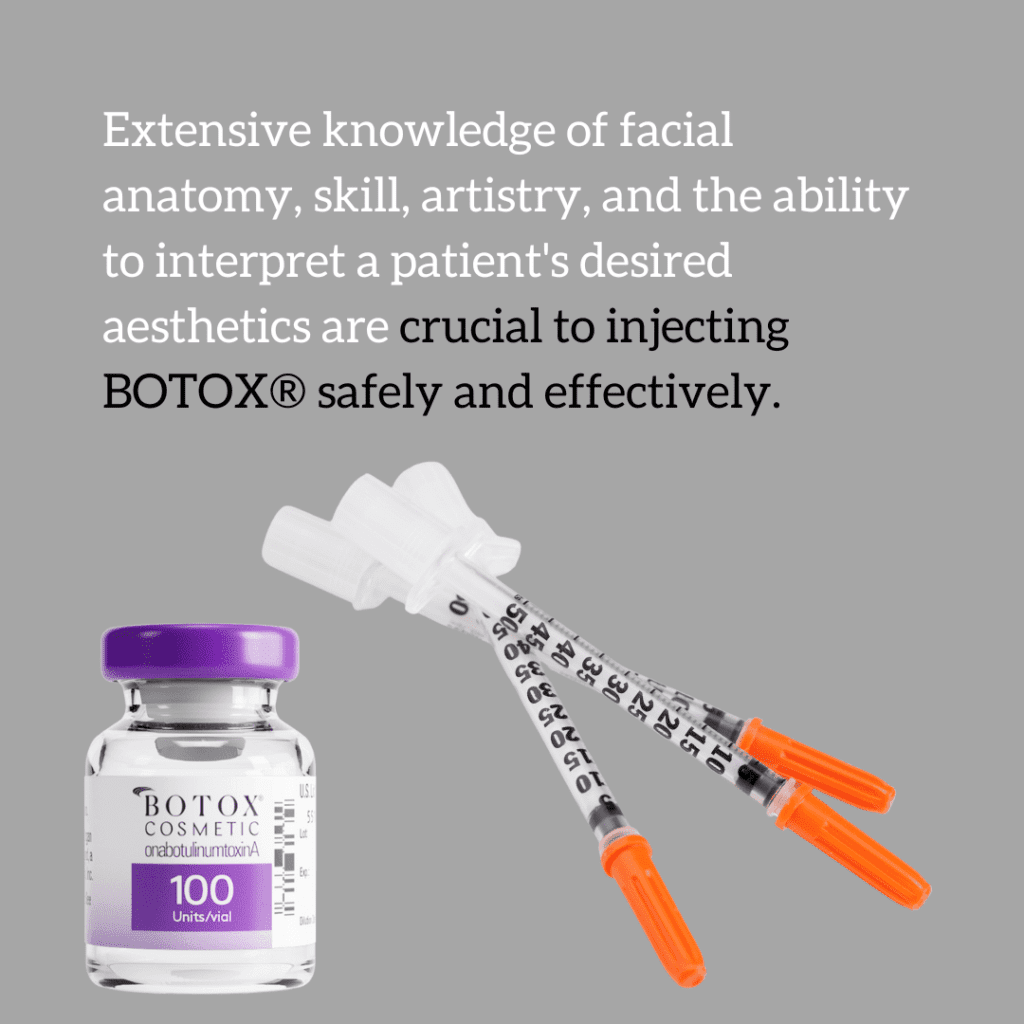By Rebecca Suess RN, BSN, CPSN, CANS, ISPAN-F
BOTOX® Cosmetic is the #1 wrinkle-reducing treatment in the world. When administered by an experienced and qualified injector, it’s rare that BOTOX® doesn’t deliver the desired result. If you have ever been disappointed by a treatment or felt that your results didn’t last very long, you may have searched the internet and found terms like BOTOX® resistance or immunity. Although incredibly rare, immunity to neurotoxins can occur. However, it is far more likely that another factor is compromising your BOTOX® results.

What is BOTOX® Immunity / BOTOX® Resistance?
Immunogenicity is the ability of an exogenous substance to enter a person’s body and cause an immune response. The immunogenicity of neurotoxin products like BOTOX® Cosmetic has been tested by measuring antibody formation after injection. The types of antibodies that can form after injection include neutralizing antibodies (NAbs) that can affect the clinical performance of a toxin product and non-neutralizing antibodies (non-Nabs) that are not expected to affect the core toxin protein.
Although very rare, immunogenicity is always a possibility, and all manufacturers of neurotoxins acknowledge its potential in their products. Every aesthetic toxin currently available on the market has been shown to elicit an immune response in at least one patient. A patient’s immune response after treatment depends on various factors, but the immunogenicity of BOTOX® Cosmetic is very low. This has been proven by studying the formation of Nabs after BOTOX® is administered to the glabellar line (between the brows) and lateral canthal lines (crows feet).
In three lateral canthal trials, 916 patients were studied for immunogenic response to BOTOX® Cosmetic. 0% developed neutralizing antibodies to BOTOX®.
BOTOX® resistance refers to when a patient has either built up antibodies against the botulinum toxin. As a result, a patient may experience a decreased duration of results or no effect at all. BOTOX® resistance is very rare. Clinical trials show that as few as 1 in 10,000 patients have true BOTOX® resistance.
6 Reasons Why Your BOTOX® May Not be Lasting as Long as You’d Like
#1 – You Need to Wait Longer for Your BOTOX® to Take Full Effect
BOTOX® works quickly but not instantly. Although you may begin to notice inhibited movement in as little as 48 hours, it may take up to 10-14 days for the full effect of BOTOX® to set in. Be patient! If two weeks have passed and you still aren’t seeing the results you desire, contact your provider. You may need a dose adjustment or refinement of the BOTOX® placement.
#2 – Your New Provider is Getting to Know You and Your Response to BOTOX®
If you have recently switched BOTOX® providers, it may take a treatment or two before you see the exact results you want. That’s because it is always safer to undertreat than overtreat with BOTOX®. A new provider may initially be conservative because they would rather you come back after two weeks for a dose adjustment than have you wait three months for an unsatisfactory treatment to wear off.
#3 – Your Age May Require that You Step Up Your Injectable Strategy
Even if you started BOTOX® in your twenties, it doesn’t mean the natural aging process completely stops. Over time, facial volume will deplete as collagen and elastin production declines. This process may cause expression lines to deepen. In this case, dermal fillers like JUVÉDERM® may also be required to get the result you want. Changes in your skin’s tone, texture, and laxity may also arise. These concerns are best treated with laser, chemical peels, physician-grade skincare, and the expertise of an Advanced Practice Esthetician. Set up a consultation with your injector and an esthetician to discuss stepping up your injectable and skincare strategy and learn how dermal fillers and other skincare treatments can both enhance and restore the youthfulness of your appearance.

#4 – Your Injector is Inexperienced or Unqualified
Just because someone can inject BOTOX® doesn’t mean they should. Unfortunately, regulations and licensing pertaining to who can safely inject BOTOX® in each state are inconsistent, and many leave a vast grey area that is difficult for patients to navigate. Extensive knowledge of facial anatomy, skill, artistry, and the ability to interpret a patient’s desired aesthetics are crucial to injecting BOTOX® safely and effectively. Unqualified injectors are prone to poor injection placement and improper dosing, leading to poor results or worse. Seek providers who have an RN or MD behind their names to ensure you get a safe treatment and optimal results.
#5 – The BOTOX® You Received was Fake
BOTOX® is never something you should bargain shop for. Too often, you’ll get precisely what you pay for. If you see a practice advertising BOTOX® at incredibly inexpensive pricing, chances are that the product is not real BOTOX®. This scenario puts you at risk for underwhelming results that are potentially dangerous. Real BOTOX® Cosmetic has a unique hologram printed on each vial, validating its authenticity. Any reputable provider will gladly show you this as proof that your treatment is being performed with real BOTOX® Cosmetic.
#6 – Your Dosing Was Not Sufficient
AbbVie®, the manufacturer of BOTOX® Cosmetic, is the only company to date that has done extensive clinical trials to determine the safe and effective dosing of BOTOX® to the upper face. In fact, they have received FDA approval for a dosage of 64 units of BOTOX® Cosmetic to the upper face. All other doses of competing neurotoxins have been antidotally passed on and never actually tested for efficacy and duration. Additionally, not all dosing of other products is created equal. So the number of BOTOX® Cosmetic units required to achieve favorable or therapeutic results may not be the same for another neurotoxin.
Another aspect of dosing that needs to be clarified is the belief that a lower dosage of BOTOX® Cosmetic leads to more natural results. The opposite is often true. Lower dosing, or only treating part of a muscle, may cause an imbalance in facial movements that may look abnormal or unnatural. This illustrates why it is essential to seek out a licensed, experienced, and qualified injector to provide your BOTOX® treatment!
Would you like to learn more about BOTOX® Cosmetic treatments at the Refinery Skin Clinic and the staff performing them? Schedule a complimentary consultation by calling (952) 479-0603, texting (952) 295-4681, or CLICKING HERE!
